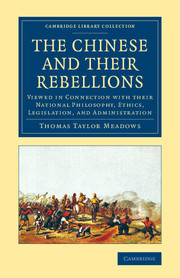Description
The Chinese and their Rebellions
Viewed in Connection with their National Philosophy, Ethics, Legislation, and Administration
Cambridge Library Collection - East and South-East Asian History Series
Author: Meadows Thomas Taylor
This 1856 publication presents an expansive treatment of the ongoing Taiping Rebellion, taking in historical and cultural factors.
Language: English
Subject for The Chinese and their Rebellions:
62.44 €
In Print (Delivery period: 14 days).
Add to cart
Publication date: 01-2015
Support: Print on demand
Support: Print on demand
Description
/li>Contents
/li>
Inspired by the lectures in Munich of the German orientalist Karl Friedrich Neumann, Thomas Taylor Meadows (1815?68) devoted himself to the study of Chinese in 1841, with the aim of entering British service. He arrived in China early in 1843 and rose quickly to the post of consular interpreter at the key treaty port of Canton (Guangzhou), where he remained for several years. His Desultory Notes on the Government and People of China, and on the Chinese Language (1847) is also reissued in this series. The present work, first published in 1856, is an expansive treatment of matters relating to 'the present Chinese rebellion', namely the Taiping Rebellion (1850?64). Meadows discusses the ongoing conflict within its historical and cultural context, offering also observations and recommendations on Anglo-Chinese relations. He closes with a lengthy disquisition on the nature and state of 'civilization' in the East and West.
Preface; Part I: 1. Political geography and administrative machinery; 2. Theory and practical working of the normal Chinese autocracy; 3. Accession, abnormal policy, and weakness of the Manchoo dynasty; 4. Rise and progress of the Chinese people; 5. M. Huc's opinions of the Chinese; 6. Hung Sew Tseuen, the originator of the rebellion; 7. Hung Sew Tseuen's establishment of a new sect of Christians; 8. Origin of the grosser fanaticisms of the new sect of Christians; 9. Retrospective account of the establishment of the Manchoo power in China; 10. Formation of Chinese political societies against the Manchoo domination; 11. Conversations of the old emperor Taou Kwang with a high mandarin; 12. Measures of the imperial authorities against the Kwang Se Christians; 13. Military and political proceedings of the Tae Ping rebels; 14. Military history of the Tae Pings, after the occupation of Nanking; 15. State of the sea-board population at the mouth of the Great River; 16. Excursion on the grand canal; 17. Intercourse of the Tae Pings with western foreigners; 18. Notice of the philosophy, morality, and polity of the Chinese; 19. Christianity and prospects of the Tae Pings; 20. The best policy of western states towards China; Part II: 1. Definition of civilization; 2. Religion, science, and art; 3. Miscellaneous illustrations from Christian and Confucian civilizations; Appendices.
© 2024 LAVOISIER S.A.S.




